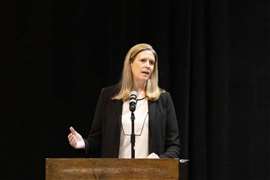Global reach is becoming an increasingly important aspect of after sales care
04 January 2010
Global reach is becoming an increasingly important aspect of after sales care for crane manufacturers, with a particular eye on training. IC spoke to four companies about their approach.
In October it was announced that Bob Hund at Manitowoc had been promoted, adding Crane Care, the company's customer services division, to his portfolio of duties. "In some respects it will be business as usual," he says. "But that's not to say there will be some changes."
The success of Crane Care, Hund adds, is through a flexible, professional and experienced workforce, offering more and better parts and service. "To continue to lead in aftermarket support globally we'll need to keep our focus on the daily business - and the basics of that business - and through continued growth and expansion."
Towards the end of 2009, Manitowoc opened its latest parts distribution centre in Jeffersonville, Indian, USA. The 13,000 m2 facility is operated by Cat Logistics and employs 50 people. It extends the cut-off time for orders by five hours to 10 p.m. (local) which means more shipments are delivered the next day.
This year also saw the implementation of a parts forecasting software to help planning and inventory in the Americas. The system is being expanded to Europe and Asia. The aim is to deliver parts within 48 hours.
Strategy
The strategy for Crane Care is to provide a complete support service for Manitowoc cranes during their entire lifecycle. "Our work begins with the delivery of the crane and in many cases it lasts for decades," says Hund.
It includes a large, on-hand inventory of replacement parts in strategic distribution centres around the world and trained technicians to help install them. Distributors around the world are backed by 24 hour Crane Care contact centres in three continents. Technicians work in Rapid Response Teams. "These are people who can be on a plane and at a job site as fast as humanly possible." The CraneStar remote asset monitoring programme is an example of another complementary service.
"There are several areas in which we feel we have opportunity to improve and expand our aftermarket services to our distributors and customers. One area is in the supply of rebuilt or remanufactured components. In this difficult economic situation, our customers are more focused on cost savings, and we feel that an expansion of our already successful EnCore programme will offer customers a competitive advantage."
Staying productive
Parts provision has been less impacted during the economic downturn, says Hund. "It is certainly true that customers need to maintain productivity for their cranes and will look at repair and replacement over new investments during difficult times.
Training plays a crucial role in crane productivity. Apart from dedicated facilities at Shady Grove, USA and La Clayette in France, there is a containerised classroom based in Asia, fitted with training stations and tools, that travels continuously to different locations. Online training is also making good progress with a range of courses now available.
"It's our belief that online training is the most cost-effective way to provide basic training in our industry with the initial requirements handled online before moving to practical and classroom training."
Hund adds: "As an OEM, we simply can't emphasise enough the value of training to the owners and users of our cranes. Properly trained operators and service technicians provide optimum efficiency and utilisation from our equipment and add value to the bottom line."
Hund continues, "We should also mention the extreme importance of using only OEM approved and supplied replacement parts. Counterfeit parts are surfacing around the globe in these difficult times and should never be used as a replacement for genuine, OEM components."
When it comes to providing services in countries like China, Russia and South America, there are a host of challenges, says Hund, such as shipping restrictions, lack of efficient transport network, language barriers, local holidays and working practices. So Manitowoc invests in infrastructure and staff itself, or through local distributors, to get close to the customer.
East to West
Sam Shang, at Chinese manufacturer XCMG's America and Oceana department, is based in Brazil. He says the company has also recognised the need for increased after sales service there. XCMG is helping its dealers set up two spare parts and service facilities in the centre and north of Brazil. They will open in 2010 and include engineers and technicians. An XCMG factory will also be built in the country by the end of 2010, although it will not produce cranes.
Apart from the two new spare parts centres, the manufacturer will help its dealers set up further spare parts facilities in about 10 cities across Brazil. In addition, its dealers will be routinely trained in maintenance. "We will also keep engineers in the XCMG service centres in Brazil for technology support. They can answer questions from end users and dealers and give technology support in time."
Shang adds that there are about 1,200 XCMG truck cranes in Brazil. "The after sales service will be a number one priority for us."
Europe-wide
Chinese manufacturers are also branching out into Europe. Peter Issitt, managing director of UK Zoomlion dealer Crowland cranes, has set up a spare parts service for the whole of Europe at the company. Although demand is not huge now, due to the recession and the fact that Chinese manufacturers are only just making headway into the continent, Issitt says the future holds great potential.
"The idea is to get a distributor network through Europe with spare parts, etcetera. At the moment the UK is the only one that has put its money where its mouth is and set up that side of it. Relationships with them [Zoomlion] have improved a lot. The mentality is completely different, but they are gaining trust in us and we are gaining trust in them."
Crowland has a team of Zoomlion engineers based in the UK and a development in recent months is an 'on-call' service, meaning engineers can fly out to customers in need.
"I would like to see a strong, reliable network across Europe, to give general coverage, while bigger problems can be handled from the UK," Issitt continues.
Refurbish
While Issitt says a lack of after sales support did not hinder sales of Zoomlions in Europe before the recession, he points out that the shortage of cranes meant that buyers were tempted to brands they had not bought before. The Western manufacturers, says Issitt, now have quite an aggressive programme to get their unsold equipment into the market and, of course, they are providing well established after sales support.
An example of Crowland's intent to help Zoomlion catch up with its western competitors is the newly refurbished paint shop at its facility. Issitt says it recognises the lack of confidence in the new crane market. Crane owners are choosing to spend UK£5,000 to £6,000 (US$8,300 to $10,000) on a new coat of paint to improve the look of their machines and help maintain their reputation, adds Issitt.
The progression of after sales services from Chinese manufacturers may still be limited in many of their export markets, but at home these services are extensive and well-established, says Issitt. "China had a slow down at the beginning of this year and is way over that now. If they were not giving people support in China, they would not sell machines," Issitt continues. "They do understand the need for service here [Europe], and Zoomlion seems to be one of the most proactive in listening and learning. You have to build a relationship [with Chinese manufacturers]. They want people who are in for the duration and not just wanting to make a fast buck."
Fast service
Wolfgang Beringer at Liebherr-Werk Ehingen in Germany agrees that customers increasingly demand an extensive service that can solve problems promptly and competently. Liebherr's own export plan has seen a sales and service subsidiary in Shanghai, China for a number of years with trained service engineers. Engineers are also spread throughout the country providing all the service equipment needed, says Beringer. "Due to the bigger number of Liebherr cranes in China over the last few years we have extended our service organization in the country."
A big challenge, however, adds Beringer, is to find service staff with good basic technical education. "As modern cranes are more complex we need people with mechanical, hydraulic and electronic understanding. After that the special crane knowledge can be taught to them by us. The service staff must also have a willingness to travel. It is also a challenge to keep the service people technically up-to-date with ongoing training, as there is also continued technical progress."
Global
On a global level the company has extended its service network with more local sales and service subsidiaries, particularly in countries like Russia and Australia, which have big landmasses. The strategy is to have Liebherr service staff worldwide. And the company has extended training for its service engineers, beyond its international training centre in Ehingen that was opened two years ago.
Training is also always provided for customers of new cranes. "We do this here in Ehingen for our German customers, but also in the worldwide sales and service subsidiaries for customers there," explains Beringer.
"When we hand over large cranes, like crawler cranes, our specialists from the service department in Ehingen do an even more intense training and accompany the customer during the first crane job."
The first maintenance on the cranes is done by the Liebherr service staff, and, at the same time, the customer is trained on the maintenance works according to the operation manual.






